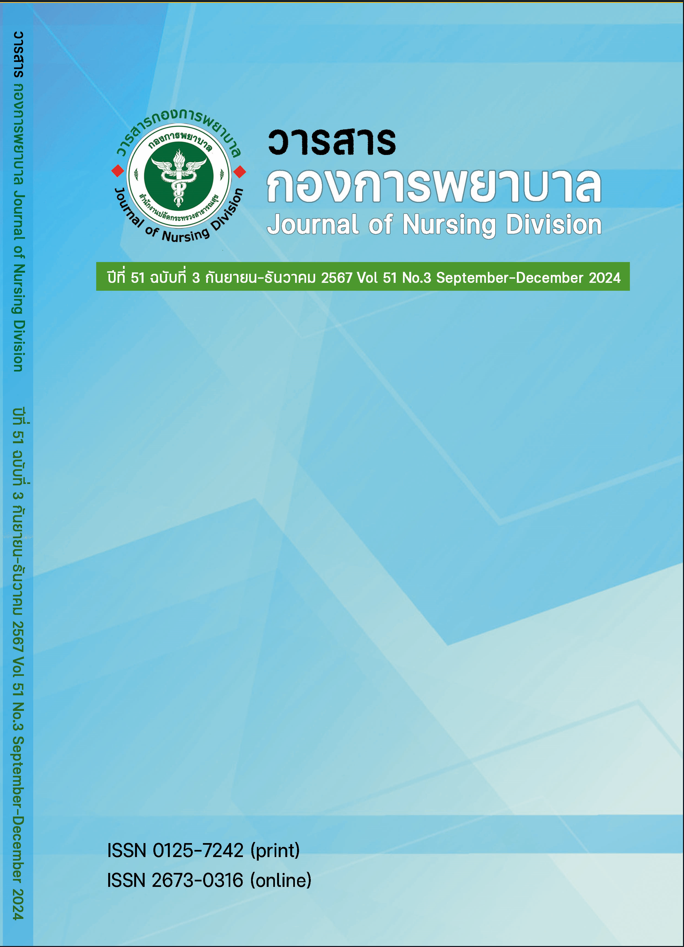ผลของรูปแบบการเตรียมพร้อมก่อนฝึกปฏิบัติการพยาบาลผู้สูงอายุในชุมชนโดยใช้สถานการณ์จำลองเสมือนจริงต่อสมรรถนะการประเมินสุขภาพผู้สูงอายุแบบครอบคลุมเป็นองค์รวมของนักศึกษาพยาบาล และความพึงพอใจต่อการเตรียมความพร้อม
Main Article Content
บทคัดย่อ
บทคัดย่อ
การวิจัยกึ่งทดลองแบบกลุ่มเดียวทดสอบก่อนและหลังนี้ มีวัตถุประสงค์เพื่อเปรียบเทียบคะแนนเฉลี่ยสมรรถนะการประเมินสุขภาพผู้สูงอายุแบบครอบคลุมเป็นองค์รวมก่อนและหลังการเตรียมความพร้อมก่อนการฝึกปฏิบัติการพยาบาลผู้สูงอายุโดยใช้สถานการณ์จำลองเสมือนจริง และความพึงพอใจของนักศึกษาพยาบาลต่อการเตรียมความพร้อมฯ กลุ่มตัวอย่างคัดเลือกแบบเฉพาะเจาะจง คือ นักศึกษาพยาบาลศาสตรบัณฑิต ชั้นปีที่ 4 จำนวน 36 คน เครื่องมือวิจัย คือ รูปแบบการเตรียมพร้อมก่อนฝึกปฏิบัติการพยาบาลผู้สูงอายุโดยใช้สถานการณ์จำลองเสมือนจริง เครื่องมือเก็บข้อมูล คือ แบบประเมินสมรรถนะของนักศึกษาเกี่ยวกับการประเมินภาวะสุขภาพผู้สูงอายุแบบครอบคลุมเป็นองค์รวม และแบบประเมินความพึงพอใจ มีค่าความตรงเชิงเนื้อหา 1.0 และ .97 ตามลำดับ ค่าความเชื่อมั่นสัมประสิทธิ์แอลฟาของครอนบาค .86 และ .72 ตามลำดับ วิเคราะห์ข้อมูลด้วยสถิติพรรณนาและการทดสอบทีแบบไม่เป็นอิสระต่อกัน
ผลการวิจัย พบว่า คะแนนเฉลี่ยสมรรถนะการประเมินภาวะสุขภาพผู้สูงอายุแบบครอบคลุมเป็นองค์รวมของนักศึกษาพยาบาลหลังเตรียมความพร้อมโดยใช้สถานการณ์จำลองเสมือนจริงสูงกว่าก่อนเตรียมความพร้อมฯ อย่างมีนัยสำคัญทางสถิติ (t 23.59, p < .05) นักศึกษาพยาบาลมีความพึงพอใจด้านการสร้างความมั่นใจในการประเมินผู้สูงอายุในระดับมากที่สุด (Mean 4.80, SD .40) ดังนั้น ผู้สอนควรใช้รูปแบบการสอนด้วยสถานการณ์จำลองเสมือนจริงเพื่อให้ผู้เรียนได้เตรียมความพร้อมฝึกปฏิบัติโดยใช้ความรู้และมีสมรรถนะในการประเมินภาวะสุขภาพผู้สูงอายุในชุมชนตามมาตรฐานวิชาการและวิชาชีพ
Article Details

อนุญาตภายใต้เงื่อนไข Creative Commons Attribution-NonCommercial-NoDerivatives 4.0 International License.
เอกสารอ้างอิง
Reference
Somchit Sinthuchai, Kanyarat Ubolwan. Fidelity Simulation Based Learning: Implementation to Learning and Teaching Management. Journal of The Royal Thai Army Nurses. 2017;18(1):29-38. Thai.
Lamad Lertlum, Chanida Tanasansutee, Supapen Panawatthanapisuit, Chadcharee Bumrungsri. Development of a Simulation-Based Learning Model. The Southern College Network Journal of Nursing and Public Health. 2019;6(Special Issue): 43-58. Thai.
Suphaporn Udomlak, Pimpimon Wongchaiya, Suthinee Mahamit, Wongsaen Hatairat Bannakit. Perceptions of humanized health care behaviors and the educational management for promoting humanized health care behaviors among graduate nurses of Boromarajonnani College of Nursing, Phayao in Academic year 2014. JNHR. 2016;17(1): 64-79. Thai.
Suparat Chaemchaeng, Wirada Atthamethakul, Duangkhae Phithaksin. The Effect of Readiness Preparation for Nursing Practice in Ward of 2ndyear nursing students, Borommarajonnani college of Nursing, Ratchaburi. Journal of Science and Technology, Ubon Ratchathani University. 2018;20(3):147-163. Thai.
Niruwan Turnbull, Wilawun Chada, Wipa Chuppawa, et al. Health Status and Factors Associated with Self-Care among Older Adults. NJPH. 2020;30(3):35-49. Thai.
Waranipa Krungkaew, Chutima Rukbanglaem, Arunrat Yotinwattanabumrung, Nisakhon Jantawee, Nannapath Saramad. The Effects of a Simulation-Based Learning on Knowledge and Practicing Skills of Nursing Students in Nursing Care of Patients with Ventilators. SCNJ. 2024;11(2):e268238. Thai.
Sunisa Khakhuen, Haruethai Kongmaha, Prangthip Thasanoh Elter, Wichitr Phantong. Activities of Daily Living and Quality of Life Among Older Adults in Nakhon Ratchasima Province. Nursing Journal of the Ministry of Public Health. 2020;30(2):104-20. Thai.
Kulyaporn Cheypho. The Study of Comprehensive Geriatric Assessment and Evaluation of A Health Assessment Procedure for Elderly Health. Royal Thai Air Force Medical Gazette. 2018;64(3):85-88. Thai.
Lalita Kaewwilai. Comprehensive Geriatric Assessment in Community: Roles of Nurse Practitioner. Journal of Public Health Nursing. 2022;36(1):136-152. Thai.
Wandee Kaewsaeng-on, Uthoomporn Dulyakasem, Sutut Hemtanon. Simulation-based learning in nursing education: classroom to online program. Journal of MCU Nakhondhat. 2021;8(11):96-111. Thai.
Somchit Sinthuchai. Kanyarat Ubolwan. Suneerat Boonsin. Effects of High-Fidelity Simulation Based Learning on Knowledge, Satisfaction, and Self-Confidence among the Fourth Year Nursing Students in Comprehensive Nursing Care Practicum. Rama Nurs J. 2017;23(1): 113-127. Thai.
Thailand Nursing and Midwifery Council. Competencies of registered nurses. 2nd ed. Bangkok: Siriyoad Publishing; 2018.
Durlak JA. How to select, calculate, and interpret effect sizes. J Pediatr Psychol. 2009 Oct;34(9):917-28. https://doi.org/10.1093/jpepsy/jsp004
Best JW, editor. Research in education. New Jersey: Prentice-Hall; 1997.
Bagnasco A, Timmins F. The impact of simulation-based training on nursing students' confidence and skill application in real-world situations. Nurse Education Today. 2021;99: 1048-11.
Duangjai Phormpayak, Waraporn Sattayawong, Juthamas Rattana-Umpa, PawadeeHamtanon, Viliporn Rungkavat. The Effects of Using Simulation Based Learning and Reflective Thinking Skill Promoting on Nursing Students’ Reflective Thinking Behavior and Clinical Decision-Making Abilities. The Journal of Baromarajonani College of Nusing, Nakhonratchasima. 2019;25(2):57-71. Thai.
Jeffries PR, Rodgers B, Adamson K. NLN Jeffries Simulation Theory: Brief Narrative Description. Nurs Educ Perspect. 2015;36(5):292-293. doi:10.5480/1536-5026-36.5.292.
Irwin A, Colella C. Use of standardized patient in mental health simulation. J Ment Health Addict Nurs. 2020;4(1):26-29.
Panida pumput, Kwanta Puriwitthayatira. The Effects of Simulation-Based Learning for Preparation of Mental Health and Psychiatric Practicum in Nursing Students. NHEJ. 2022;5(3):37-46. Thai.


